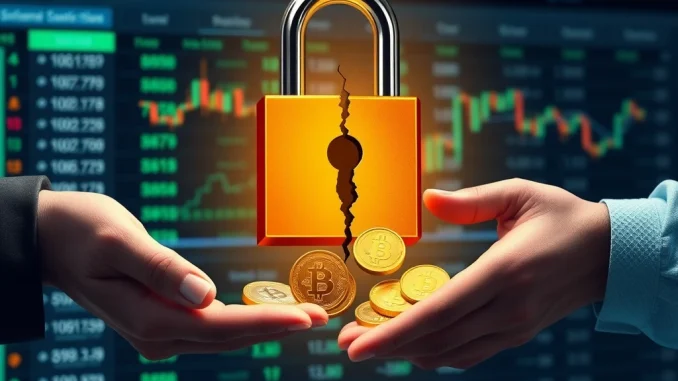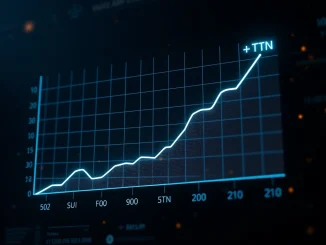
The world of decentralized finance (DeFi) is exciting, but it’s not without risks. Users of KiloEx, a prominent decentralized exchange (DEX), experienced this firsthand when the platform suffered a significant exploit. The incident, which occurred on April 14th, resulted in a loss estimated at $7 million, sending ripples of concern through the community. For anyone holding assets or positions on KiloEx, the immediate question was: what happens now? The good news is, KiloEx has stepped forward, unveiling a plan aimed at addressing the impact of the KiloEx exploit and compensating those affected.
What Happened During the KiloEx DEX Hack?
On April 14th, the KiloEx platform became the target of a malicious attack. This type of incident, often referred to as a DEX hack, exploits vulnerabilities in the smart contracts or infrastructure of a decentralized exchange. While the technical specifics of how the attackers managed to siphon off approximately $7 million are still being analyzed by security experts, the immediate consequence was clear: disruption and financial loss for users.
Following the discovery of the exploit, KiloEx took swift action to halt trading and suspend the platform to prevent further damage. This necessary step, however, left many users with open positions, unsure of their status or potential losses during the downtime. The period of suspension added another layer of anxiety for the community.
How Does the KiloEx Compensation Plan Work?
Responding to the urgent need to address user losses, KiloEx announced details of its KiloEx compensation plan via its official communication channels. The core principle of the initial plan focuses on users whose trading positions were open and active when the platform suspension occurred.
According to the announcement, KiloEx commits to providing full compensation for these specific users. The compensation will cover the difference based on their increased losses or reduced profits that resulted directly from the platform being suspended and positions being frozen or unable to be managed during that period. This aims to ensure that users aren’t unfairly penalized by the necessary security measures taken by the platform after the KiloEx exploit.
Key aspects of this part of the plan include:
- Targeted compensation for users with open positions during the suspension.
- Calculation based on the financial difference (increased loss or reduced profit) incurred due to the suspension period.
- Commitment to full compensation for this specific impact.
Details regarding compensation for other potential impacts of the hack, such as lost funds not tied to open positions, are eagerly awaited by the community, but this initial step addresses a critical group of affected users.
Why is Crypto Compensation Crucial After an Exploit?
In the aftermath of a security breach like the one KiloEx experienced, implementing a clear crypto compensation plan is vital for several reasons:
- Restoring Trust: Security incidents erode user confidence. A commitment to compensation demonstrates accountability and a dedication to user welfare, which is essential for rebuilding trust in the platform and the broader DeFi ecosystem.
- User Retention: Users who suffer losses are likely to leave a platform unless their concerns are addressed. Compensation helps retain the existing user base.
- Industry Reputation: How a platform handles a hack sets a precedent. A responsible approach to compensation can help maintain a positive reputation within the competitive crypto landscape.
- Mitigating Negative Impact: While a hack is damaging, a proactive compensation strategy can help mitigate some of the negative press and community backlash.
However, executing a compensation plan in the decentralized world presents unique challenges, including accurately identifying affected users, verifying losses transparently on the blockchain, and securing the funds needed for reimbursement, especially after a significant loss like $7 million.
Strengthening Decentralized Exchange Security
The KiloEx incident serves as a stark reminder of the ongoing challenges in ensuring robust decentralized exchange security. While DEXs offer benefits like user control over private keys and reduced counterparty risk compared to centralized exchanges, they are still susceptible to smart contract vulnerabilities, oracle manipulation, and other forms of exploits.
Platforms must continuously invest in security audits, bug bounty programs, and real-time monitoring systems. For users, understanding the risks involved and taking precautions, such as not leaving large amounts of funds on any single platform, remains important. The industry learns from every incident, and hopefully, the lessons from the KiloEx exploit will contribute to strengthening security practices across the DeFi space.
What Does This Mean for KiloEx Users?
For users impacted by the hack, the announcement of the compensation plan is a significant step. While the full scope and timeline of the reimbursement process are likely to be detailed further, this initial commitment for users with open positions provides a degree of certainty during an uncertain time. Users should monitor KiloEx’s official channels for updates and instructions on how the compensation will be distributed.
Summary: A Step Towards Recovery
The $7 million DEX hack on KiloEx was a serious event, highlighting the persistent security risks in the DeFi sector. However, KiloEx’s prompt announcement of a crypto compensation plan, specifically addressing users with open positions affected during the platform suspension, is a crucial move towards recovery and rebuilding user confidence. While challenges remain in the full execution of the plan and the complete restoration of services, this initial step signals the platform’s commitment to its community and its intention to navigate the aftermath of the KiloEx exploit responsibly. Ensuring robust decentralized exchange security remains a paramount concern for the entire industry moving forward.



